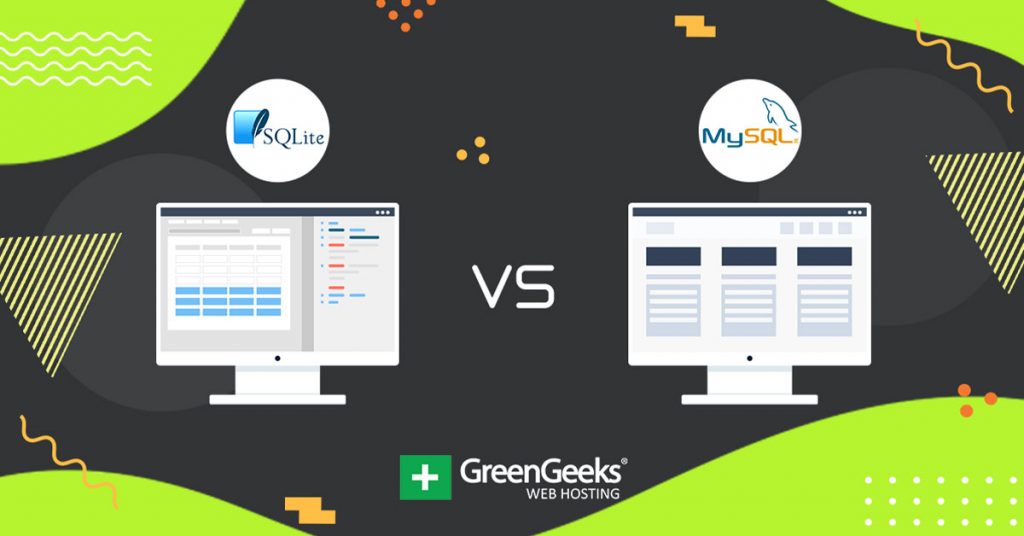Many web developers do not get to choose the database they use because web hosting companies typically pick for them. However, when you have the choice, it can be difficult to choose one. For instance, MySQL and SQLite are both similar databases but have different strengths and weaknesses.
Both of these are known as Relational Database Management Systems (RDBMS), which tend to be the most popular type. This is due to them having better organization tools, which make them easier to use.
Today, we are going to take a look at what each one of these is, how they differ, and why it even matters.
What Is A Relational Database Management System?
Before we specifically talk about MySQL and SQLite, let’s talk about what an RDBMS actually is.
An RDBMS is a type of database that stores data in a table format, which can be used in relation to other stored data. The tables are often referred to as relations and can hold a lot of information.
Due to this structure, information is very easy to find within the database while compiling correlations to one another.
For instance, finding customers who bought a certain item who live in the state of Texas. This is a relational query within the database table sets.
As a result, RDBMS has become the most popular type of database in regard to web development. In most cases, when someone says database, they are referring to an RDBMS. These databases bring a wide array of benefits, which have made them so popular.
These include:
- Easy to Manage: Tables within the database are easy to manipulate. In other words, it’s easy to make changes or update tables. And you can grant certain users acces to certain tables. This ensures staff members only see the info they need.
- Scalability: The information a website collects and stores over time is constantly growing. And to hold all of this data, your database has to grow alongside it. That is a core strength of RDBMS. You can easily extend your database, although you may need additional hardware to do so.
- Maintenance: One of the top recommendations to increase site perfromance is to optimize your database. And when it comes to RDBMS, it’s really easy to do as most have built in tools to help optimize the perfromance and avoid duplicate data.
Overall, this type of database is the perfect solution for websites, which is why they are used today.
What Is MySQL?
MySQL is an open-source RDBMS based on Structured Query Language (SQL) that is by far the most popular database. It currently sits at a staggering market share of 44.49%, which makes it the dominant force when it comes to databases.
In most web hosting environments, MySQL is the default option. In many cases, you cannot use an alternative depending on your host. This is because MySQL requires a server to run, and it is typically preloaded into that server.
This is especially true for shared hosting environments.
This database is ideal when you have multiple users. Each user can be assigned access to a specific part of the database. This helps ensure that sensitive information is only viewable by the roles that need access to it, like customer payment details.
It supports over 25 unique data types, which makes it usable in just about any situation.
What Is SQLite?
SQLite is a software library that provides a lightweight RDBMS solution. For comparison’s sake, the SQLite library is roughly 250 KB, whereas MySQL is around 600MB. And to top it off, all of this data is stored in a single file, which makes it really easy to copy and move.
Normally, an RDBMS requires a server to operate. SQLite separates itself from the rest by not requiring an actual server. Instead of having to communicate with the server to a client/server architecture, the application is integrated into SQLite.
Or in simpler terms, you can directly read and write on files within the database. While all of this will result in a much simpler database to use, it is not as robust or versatile as other RDBMS solutions. This is part of why it only has a market share of 3.1%.
That said, it is ideal for small projects that do not require multiple users.
So What is the Difference Between SQLite and MySQL?
Now that we know what each one is and some of what it brings to the table, it’s time to specifically talk about how they differ from one another.
A great starting point is the requirements for use.
MySQL requires a server to operate, whereas SQLite does not. This makes SQLite much cheaper for smaller projects, however, due to some of the SQLite limitations, it may not be possible to do what you need.
One such limitation is that SQLite does not support multiple users very well. While it is possible to use multiple users, it is not recommended. For instance, if you have two users trying to write at the same time, the database will briefly lockdown.
This isn’t an issue in MySQL. In fact, multiple users are one of its greatest strengths. As I mentioned earlier, you can assign specific permissions to each user and multiple users can write on different files simultaneously.
This is a big reason why it is so popular.
Another shortcoming with SQLite is that it can’t handle a lot of data at once. Once you exceed that capacity, the performance of SQLite will degrade. This is why SQLite is only used for small projects and sites. In comparison, MySQL can easily scale for the user’s needs.
That said, you will need to buy more hardware to extend the database, but you will always have the option, unlike SQLite.
Ultimately, SQLite is a lightweight solution designed for small projects that will only have one user, while MySQL works for projects of all sizes and supports multiple users.
Due to these differences, MySQL has become the go-to for RDBMS solutions.
Which One Should I Use?
Well, it really depends on what you need an RDBMS for, and if you actually have a choice in the matter.
First, you need to know if your web host will support another database. In general, shared hosting environments will limit you to MySQL (or MariaDB, a MySQL fork). This is because a shared environment needs to work for everyone using it.
However, if you purchase a managed VPS account, some web hosts will install another database if you request it.
It really depends on the web host.
If the web host supports a different database, then deciding on which one to use should come down to two main factors:
- How much traffic does the website recieve?
- Do you need multiple users?
If your website exceeds 100 hits a day and requires multiple users, MySQL is what you want to use. If not, SQLite is a fine option. However, if you think the answers to these questions may change, MySQL is probably still the better option.
FAQ
Do All Websites Use Relational Databases?
No.
Many websites will opt for other options. Recently, NoSQL (non-tabular databases) have become more popular. They come in a variety of forms, and In many cases, websites will use relational databases in conjunction with others.
Again, it really comes down to what you need to use a database for. There are a lot of solutions that may perform better in a certain set of conditions.
What is the Difference Between SQL and MySQL?
This remains one of the most asked questions for beginners. To put it simply, SQL is a language used to communicate with databases, whereas MySQL is a database that uses the SQL language. The most confusing part is the name, but there is a good explanation.
Michael Widenius was one of the inventors of MySQL, and he named the database after his daughter, My.
Do Both SQLite and MySQL Support XML?
MySQL supports XML. You can export tables into the XML format to store them outside of the database, which can help back up important information.
On the other hand, SQLite does not support XML, at least not natively.
There are workaround tools you can use to like SQLiteToTxt. It’s more convoluted than MySQL, but the option exists if you absolutely need it.
My Web Host Has MySQL Installed, What Can I Do?
Using a different database from the default option on a web host can be tricky. Mainly because you typically need to make a request. To do so, simply contact your web host and submit the request to have them install a different database on the server.
These requests can only be made on dedicated servers or VPS. Shared hosting environments will not accommodate these requests because it affects everyone on that server.
If the web host supports another database like SQLite, they may have resources on how to use it.
Is It Worth Changing Databases?
For most standard websites, it’s not really worth the effort to switch from the default database. At least, assuming your web host is using something like MySQL or MariaDB. These databases will perform very well for every type of website.
Realistically, the only reason you would swap databases on a standard website (blog, e-commerce, etc.) is that you prefer one over the other. It’s very similar to choosing a CMS.
They all accomplish the same tasks, and you’re going to pick the one you know how to use.
Do Both of These Support Running SQL Scripts From A File?
Yes.
Running SQL scripts from a file is a great way to save time when setting up a website. Experienced web developers often have files they run when building a site from scratch.
This ensures that every database can be set up in an identical way.
More importantly, running scripts from files can save you a lot of time manually entering the information. That said, there are many instances where using files to run scripts is not recommended, so proceed with caution.
How Often Should I Backup My Database?
This really depends on the volume and frequency new data is added, but I always recommend doing it at least once a week. This will ensure that if anything does go wrong, like a hard drive failure, at most you only lost a few days.
One of the best ways to do this is to set up automatic backups. This makes it easy for you to manage and keeps your data safe. Just remember to store your backup in a different location from the original.
If the hard drive fails and you lose both the original and backup, well, it’s not pretty.
SQLite And MySQL Both Work on WordPress
Which one you use really comes down to preference and individual needs, but you can rest easy that both of these and many other databases work with WordPress. While I would recommend MySQL due to the plethora of resources available, the choice is yours.
Just remember that ultimately, the option you can use for databases is determined by your web host. If you are not satisfied with those options switching to a web host that supports what you need is a great option.
Which database do you prefer using? How big of an impact did the database a web host offers make on signing up?



